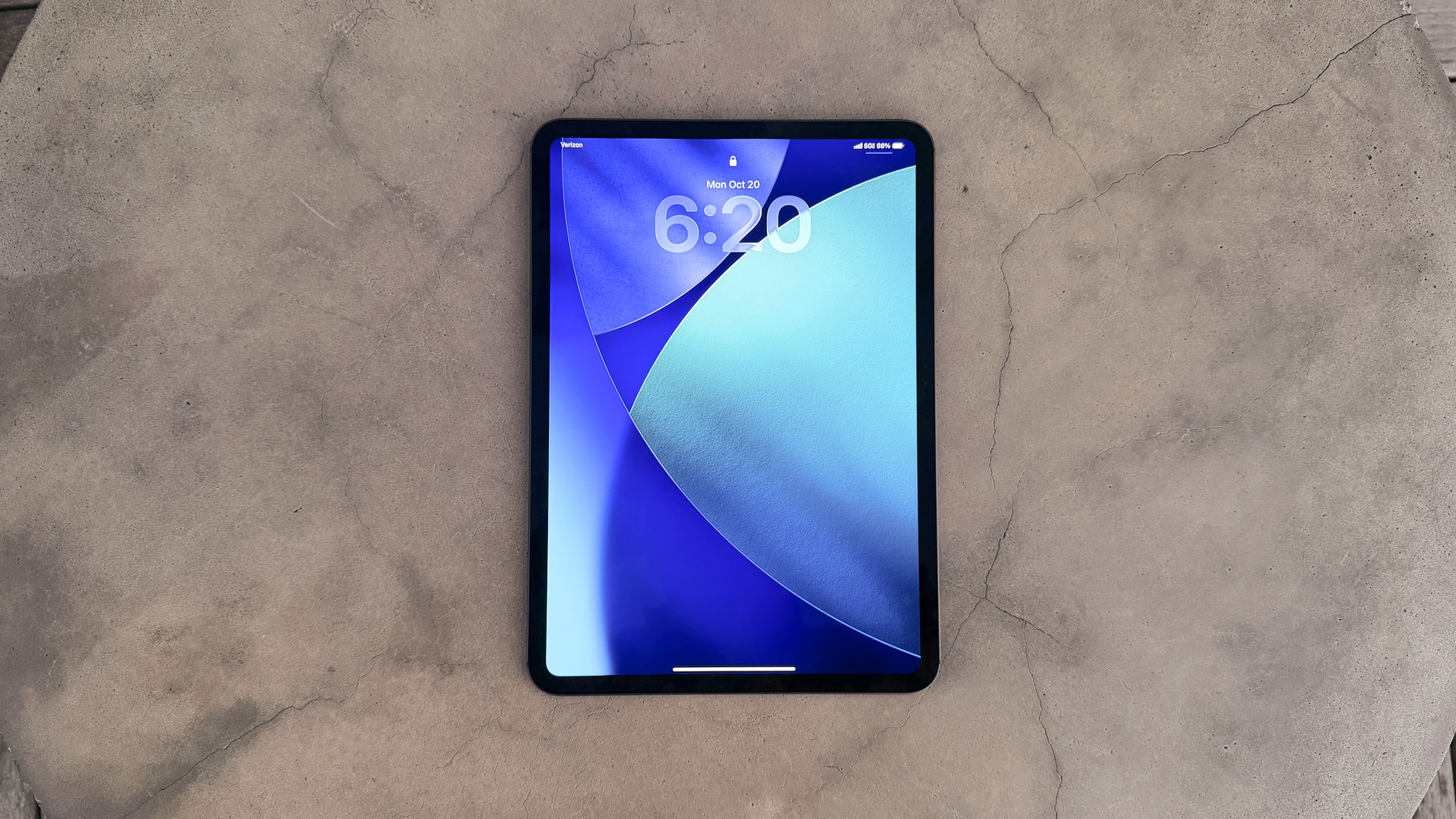TechRadar Verdict
Apple hasn’t changed much with the iPad Pro M5, but it didn’t really need to. The update to the M5 chip makes Apple’s top-of-the-line iPad faster and more capable than ever, and able to handle multitasking, creative apps, and even AAA games with ease. It pairs that performance with the same stunning OLED Ultra Retina XDR display, excellent battery life, and premium build quality as its predecessor. While the price remains high and color options are limited, the 11-inch iPad Pro M5 is still the ultimate Pro tablet for power users who want top-tier performance and versatility.
Pros
- +
Amazing performance from M5 chip
- +
Vibrant and visually immersive display
Cons
- -
No major changes to the design
- -
Expensive
Why you can trust TechRadar
Apple iPad Pro 11-inch (2025) review: One-minute review
Apple hasn’t changed much with the latest iPad Pro, and with good reason. It has the same sleek, ultra-thin aluminum body, available in either 11-inch or 13-inch sizes, as its predecessor, and like last year’s model it feels effortlessly premium in the hand.
The Ultra Retina XDR display is also unchanged, but it’s still stunning, with vibrant colors, deep blacks, and a peak HDR brightness of 1,600 nits. Whether for daily use, watching a film, gaming, or writing with an Apple Pencil, it felt buttery smooth and visually immersive. It’s certainly still a step up from the screen on the iPad Air.
What is new here is the M5 chip, which makes Apple’s most powerful iPad faster and more capable than ever. While that’s a tall order, Apple has accomplished it, and responsiveness feels virtually instantaneous.
In my time with the iPad Pro, multitasking and creative work felt effortless. I could edit photos in Pixelmator, draw in Procreate, or even cut 4K footage in Final Cut Pro without a hiccup. AI features, like handwriting cleanup and image upscaling, happen almost instantly. Gaming is equally impressive, with smooth frame rates and detailed graphics making even triple-A titles look incredible.
While the Magic Keyboard is an extra cost as an accessory, when the iPad Pro is docked in it it feels closer to a laptop than ever, letting you type, multitask, and navigate iPadOS 26 seamlessly.
This year, Apple also added its N1 wireless chip, bringing Wi-Fi 7, Thread support, and a move to a made-in-house modem for 5G connectivity. This means that when you’re on the go – whether you’re working from a café or traveling – connections feel fast and reliable, with strong download and upload speeds if you opt for a cellular plan. The 12-megapixel Center Stage camera keeps you perfectly framed in video calls, and the rear camera handles casual photography well.
It’s expensive, and the color options remain limited, but for power users who want the ultimate iPad experience, the 11-inch iPad Pro M5 is hard to beat – and I’m happy to report that the starting prices of $999 / £999 / AU$1,699 for the 11-inch, or $1,299 / £1,299 / AU$2,199 for the 13-inch iPad Pro with M5, are the same as last year. That said, the rest of the iPad lineup – the entry-level iPad with A16, the iPad mini, and the iPad Air with M3 – remain especially strong.
Sign up for breaking news, reviews, opinion, top tech deals, and more.
The latter, which also comes in 11-inch and 13-inch sizes, will likely be the strongest competition to the iPad Pro, and whether you go for the iPad Pro or the iPad Air will ultimately depend on how much you care about design, display, and long-term performance. But know that, if you’re considering upgrading to the M5 Pro from a previous iPad Pro, you’ll be best served if you’re rocking the M1 model or earlier, as you’ll enjoy tangible speed improvements, the better screen, and the all-new design.
Apple iPad Pro 11-inch (2025) review: Price & availability
Apple’s 11-inch and 13-inch iPad Pro with M5 officially launched on October 22, 2025. In addition to deciding which size you want, you’ll need to pick between two colors, and storage and connectivity options.
In either Space Black or Silver, the 11-inch iPad Pro M5 starts at $999 / £999 / AU$1,699, while the 13-inch iPad Pro with M5 starts at $1,299 / £1,299 / AU$2,199. If you’re keeping track generation over generation, there’s no price increase there. Prices go up from there if you want to add cellular or get more storage. The iPad Pro starts at 256GB, but also comes in 512GB, 1TB, or 2TB configurations; the 256GB and 512GB models come with 12GB of RAM, while the 1TB and 2TB models come with 16GB.
Apple iPad Pro 11-inch (2025) review: Specs
| Row 0 - Cell 0 | iPad Pro 11-inch | iPad Pro 13-inch |
Starting price | $999 / £999 / AU$1,699 | $1,299 / £1,299 / AU$2,199 |
Operating system | iPadOS 26 | iPadOS 26 |
Chipset | M5 | M5 |
Memory (RAM) | 12GB or 16GB | 12GB or 16GB |
Storage | 256GB / 512GB / 1TB / 2TB | 256GB / 512GB / 1TB / 2TB |
Display | 11-inch tandem OLED Ultra Retina XDR (2420 x 1668) | 13-inch tandem OLED Ultra Retina XDR (2752 x 2064) |
Cameras | 12MP wide main, 12MP ultrawidefront | 12MP wide main, 12MP ultrawidefront |
Connectivity | Wi-Fi 7 and Bluetooth 6. 5G Sub-6Ghz and Gigabit LTE on Cellular models. | Wi-Fi 7 and Bluetooth 6. 5G Sub-6Ghz and Gigabit LTE on Cellular models. |
Weight | 440g (446g for cellular) | 579g (582g for cellular) |
Dimensions | 249.7 x 177.5 x 5.3mm | 281.6 x 215.5 x 5.1mm |
Apple iPad Pro 11-inch (2025) review: Design
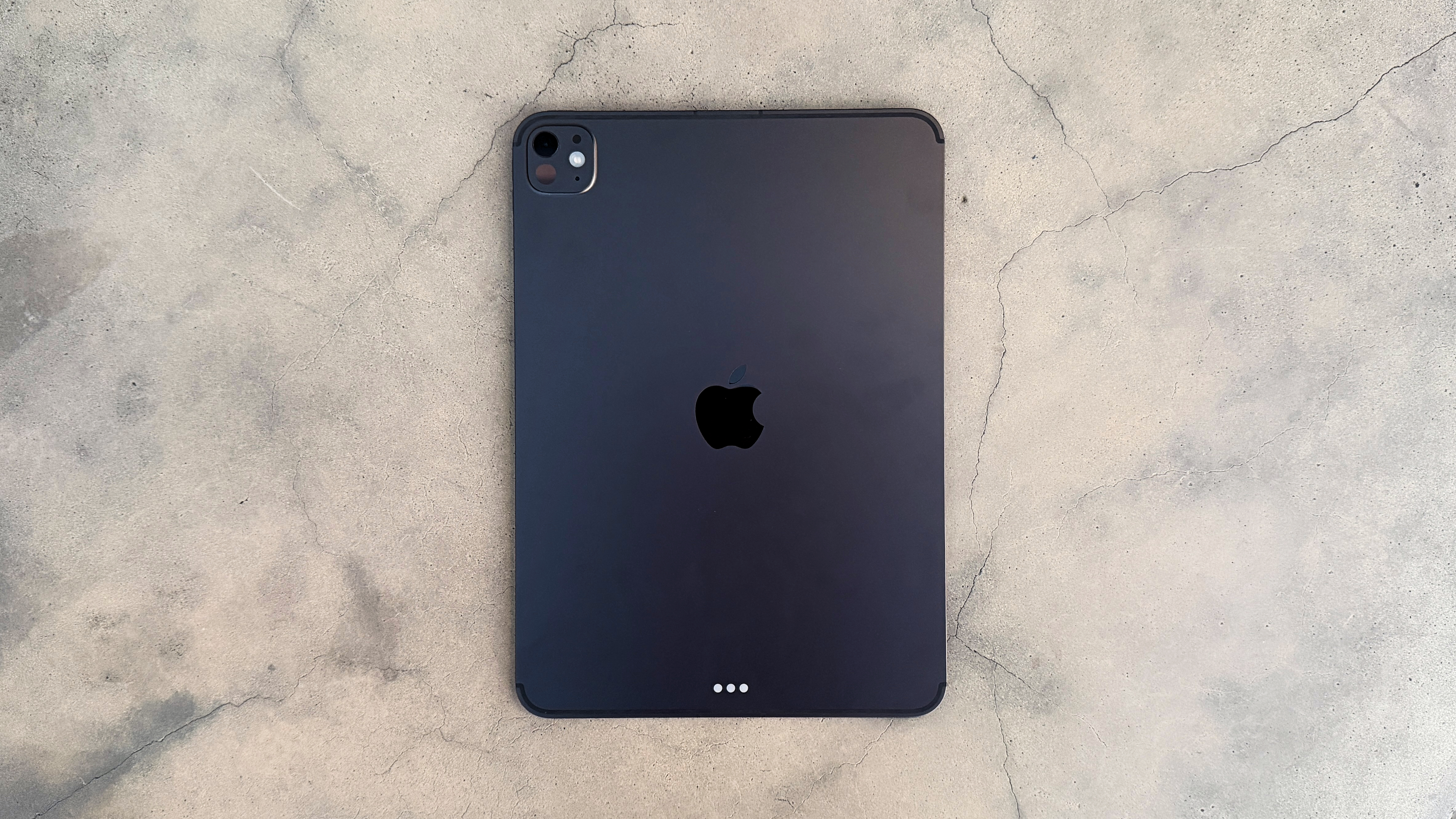
- It’s still an ultra-thin, sleek iPad
- No design changes compared to the previous generation
- The 11-inch might be the perfect size for most
Given that Apple rolled out a radically thinner and overall much sleeker design with its last-generation iPad Pro in 2024, it’s no surprise that the company is sticking with the same build for this generation’s model; as noted the biggest change here is under the hood, and indicated by the ‘M5’ in the name.
Apple’s 11-inch iPad Pro still looks elegant, sleek, and sharp, and I enjoyed testing the smaller variant, given how much more portable it is. As mentioned, there is also a larger 13-inch iPad Pro powered by the same M5 chip.
The design from generation to generation is identical – the 11-inch iPad Pro M5 measures 249.7 x 177.5 x 5.3mm and weighs 444 grams with just Wi-Fi, or 446 grams with cellular connectivity. And it also beats out the 11-inch iPad Air with the M3 chip for both thickness and weight – at 6.1mm and 460 grams the Air is slightly thicker and heavier.
Even held in one hand, the new Pro feels light. I often held it vertically with my left hand while navigating the interface, or scribbling notes with an Apple Pencil – both Pro and USB-C models are supported – with my right. Watching a film, making a FaceTime call, or reading horizontally while holding the tablet with both hands is equally comfortable. This is also the best orientation to get the most out of the great stereo speakers, as these live on the left and right sides. The sound produced is pretty robust and surprisingly loud given how thin the iPad Pro is.
The 11-inch size, paired with the Magic Keyboard, is practically the perfect mini laptop within the iPad lineup. The weight is well balanced, and the screen – thanks to windowed apps – feels surprisingly expansive.
Apple has stuck with an aluminum build all around, which keeps the iPad light while allowing it to be ultra-thin without sacrificing durability. At 5.3mm for the 11-inch and 5.1mm for the 13-inch, the iPad Pro is actually thinner than the iPhone Air, which measures 5.6mm.
The biggest disappointment for me is that despite the new chip, color options remain limited to Space Black or Silver. Both look good, and Pros might prefer subtle tones, but a more vibrant option, like the iPad Air’s purple or an iPhone 17 Pro-style orange, would have been fun.
A color-matched Apple logo sits centered on the back of the Space Black 11-inch iPad Pro; it’s shiny against the matte frame and slightly darker. There are also three silver Smart Connector dots at the bottom, which is how the Magic Keyboard connects without any setup, with the main camera bump at the top left when the slate is held vertically.
The main camera array is unchanged from the previous generation, with the slightly raised bump housing a 12-megapixel wide camera, LiDAR sensor, and adaptive True Tone flash. Beneath the aluminum finish are ample magnets to support cases, including the Magic Keyboard.
When you hold the iPad Pro vertically, the power button is on the top right, with the volume controls nearby. The Apple Pencil Pro magnetically attaches to the right side and charges wirelessly, while the USB-C Pencil attaches but requires a charging cable. The USB-C port sits on the bottom vertically or the right side horizontally.
The volume and power buttons are also easy to locate when you’re using the iPad longways – power moves to the top left, and the volume rocker shifts to the top left. You don’t need to worry about unlocking with the power button either; a simple tap on the screen lights up Face ID, which is built into the front camera, and easily unlocks the iPad. Of course, you can also use it to authenticate purchases and autofill passwords.
It’s a practical design, and overall, this remains Apple’s most premium and luxurious iPad. Like the iPhone Air, its design prioritizes thermals and ergonomic weight, making the iPad Pro comfortable to use and letting the display truly shine.
- Design score: 4 / 5
Apple iPad Pro 11-inch (2025) review: Display

- Stunning tandem OLED display with punchy, vibrant colors
- It delivers an immersive visual experience
Apple is sticking with its impressive tandem OLED Ultra Retina XDR display, and it’s truly a best-in-class screen. Colors look especially vibrant and accurate, with rich detail and subtle gradations, but it really excels at delivering incredibly strong contrast – something the 11-inch iPad Air with the M3 chip can’t quite match, considering that this is an OLED panel, and a unique one at that.
I thoroughly enjoyed having multiple windows set up within iPadOS 26, viewing them side by side or jumping between Mail, Gmail, Slack, Chrome, Safari, and Messages. Taking in the latest episode of The Morning Show on Apple TV, or films or series from other streamers, was a delight – the iPad Pro really excels at delivering these visuals. Whether you’re watching content, drawing in Procreate, editing photos in Pixelmator, gaming, or using Final Cut Pro or DaVinci Resolve, the display can easily scale to the task depending on your workflow.
Just as with the previous-gen Pro, the tandem OLED is essentially two OLED displays stacked together to produce higher brightness levels for stunning visuals – and it really delivers. The Ultra Retina XDR display offers 1,000 nits of brightness across the full screen, can spike up to 1,600 nits of peak brightness for HDR content, and delivers a 2,000,000:1 contrast ratio. The display resolution comes in at 2420 x 1668 at 264ppi.
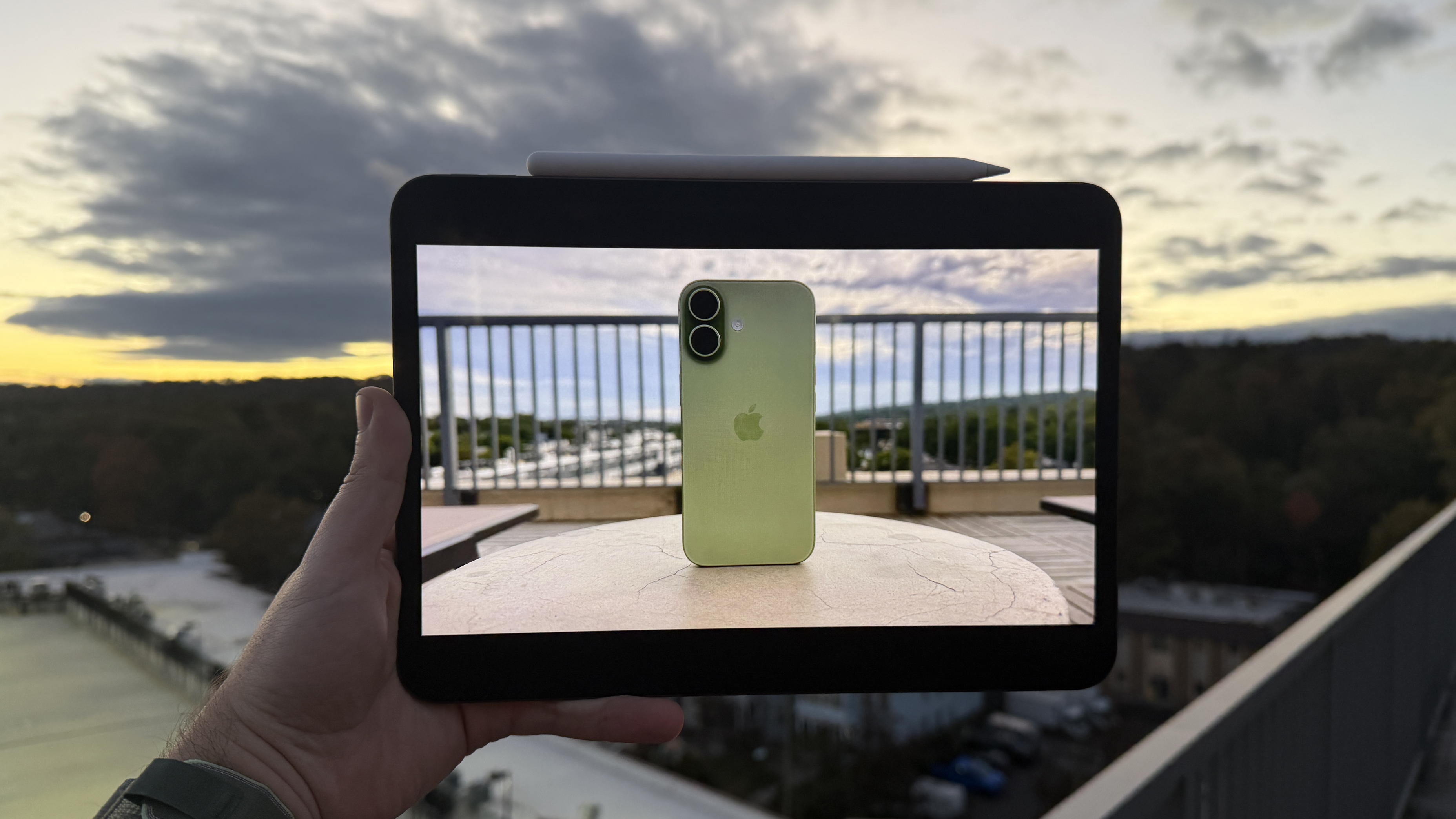
Another key advantage of going Pro with an iPad is ProMotion, which enables an adaptive refresh rate between 10Hz and 120Hz and ensures that games (hardware-accelerated ray tracing is supported here) and other content look buttery smooth. It also helps when writing with Apple Pencil, further reducing latency, and makes scrolling through iPadOS 26 feel noticeably more fluid.
Apple ships the 11-inch iPad Pro with an oleophobic coating that helps reduce reflections and resist fingerprints, and it does an admirable job – if the screen is off, you’ll notice smudges, but when it lights up, the brightness makes them fade away. It still catches some reflections, though, especially outdoors on a sunny day or under harsh indoor lighting. The fix here is to opt for the Nano-Texture Glass display, which works wonders, but it comes at an added cost. My test unit has the standard glass.
Considering the high price of the iPad Pro with M5, a big part of that is down to this display, and I’ll give it to Apple – it’s the best display in the iPad lineup and one of the best I’ve used on any device. Whether I was watching a movie, playing a game, or doing more routine things, it was a visually immersive experience with vibrant, punchy color and deep blacks. You’ll need to decide, though, if you really do need the best display, as the 11-inch iPad Air delivers an excellent mix of performance and features, albeit with a slightly less advanced display.
- Display score: 5 / 5
Apple iPad Pro 11-inch (2025) review: Cameras
- The front-facing camera is again located in the ‘proper’ spot
- CenterStage isn’t new, but it still works wonders for video calls
- The rear camera is fine for a tablet camera
Tucked into the top bezel, and centered above the screen when the iPad is held or docked horizontally, is a 12-megapixel Center Stage camera. You might recall that Apple made the decision to move it to the ‘proper’ location for a tablet with the last generation, and that placement, along with the same camera specs, carries over to the iPad Pro M5.
It’s basically in the perfect spot, especially when the iPad Pro is docked in a Magic Keyboard or a similar third-party folio, where you’re using the iPad in a similar fashion to a laptop. This makes it ideal for recording videos – maybe a self-tape – but also for video calls through FaceTime, WebEx, and Zoom, and other services.
The main appeal of this camera is in Center Stage, which uses software magic to keep you in the frame when you’re on calls, automatically panning and zooming to keep you centered. This is helpful if you like to walk and talk on calls, but also, more practically, if you’re cooking and hop on a FaceTime call – you can rest the iPad somewhere and freely move around without worrying you’ll be out of the frame. It’s excellent.
There’s also the same camera as last year on the back. If you’re someone who likes to take photos with a tablet, you can certainly do that here, and the 12-megapixel lens is good. I’ll share a gallery of some test shots below, but you’re still better off with your iPhone’s camera, or an actual camera.
- Camera score: 4 / 5
Apple iPad Pro 11-inch (2025) review: Software
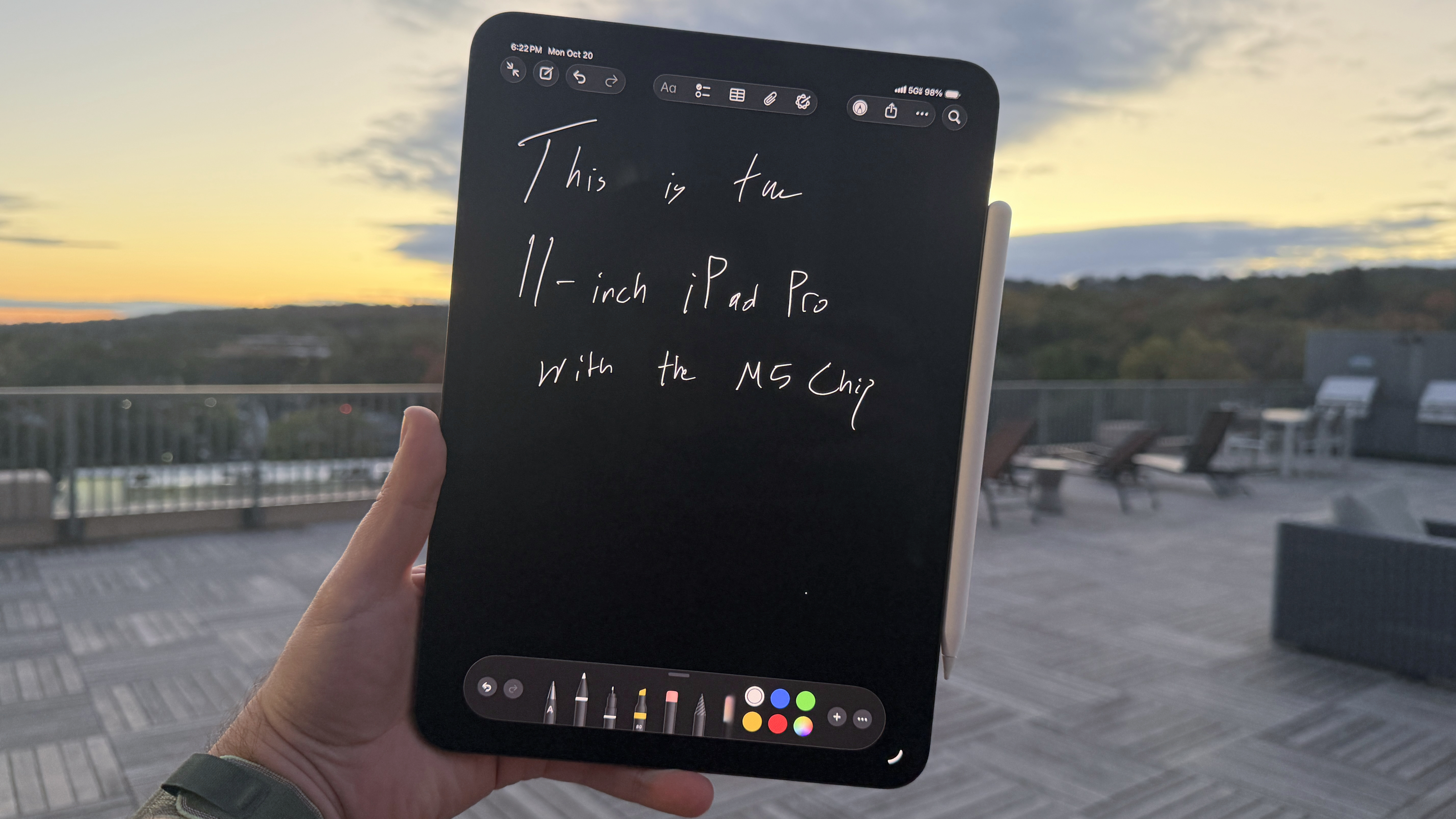
- iPadOS 26 breathes new life into the iPad Pro
- Mainstay features like windowing apps run very well here
While every iPad comes running iPadOS 26 out of the box, the 11-inch and 13-inch iPad Pros with M5 are the first to launch with iPadOS 26. It certainly feels at home on the most expensive iPad in the lineup, and makes the most of the M5 chip inside.
I can freely resize pretty much any number of apps into windows with overlapping, or just set it up as side-by-side split. I have a menu bar up top when tasks call for it, and a dock down below, and I can drag and drop elements between apps as I see fit. That could be to edit a photo in Photoshop or Pixelmator after importing from Photos or Files, save it, and then load it directly into our content management system to build an article, or selecting photos and dropping them into Messages or an email.
This flexibility is definitely the highlight of iPadOS 26, but if you want to focus on one thing at a time you can also go full-screen with apps. I used a wide variety of apps on the iPad Pro with M5, covering my full workload: Safari, Chrome, Gmail, Slack, Google Drive and Docs, and occasionally photo-editing apps like Photoshop or Pixelmator. I routinely kept all of these open, along with Messages, Mail, Music or Spotify, Notes, Calendar, and Photos.
For personal use, I streamed via Apple TV (yes, it’s weird not writing Apple TV+ anymore), Disney+, Netflix, and Peacock, took FaceTime calls, and tried plenty of games, including Mini Metro, RFS+ Pro, Disney Dreamlight Valley, Resident Evil 4, Assassin’s Creed Mirage, and Fortnite. Everything played smoothly for the most part, with barely a slowdown or hiccup.
While the vastly improved, AI-infused Siri (still) isn’t here yet, I got a sense of how Apple’s other AI and machine learning features perform, along with some third-party ones. Clean-Up for photos ran swiftly, performing the expected action after the main model download. I also used summarized notifications, priority notifications, and dabbled with ‘Reduce Interruptions’ in Focus Mode. Live Translation was quick, on a par with competing services, and Logic Pro 2 for iPad’s stem splitter worked very well.
I spent most of my work time with the iPad docked in the Magic Keyboard. This is the slightly more premium ‘for iPad Pro’ version of Apple’s accessory, with 14 rows of function keys, a full QWERTY keyboard, and an expansive trackpad. Typing feels great, with good travel and punchy keystrokes – I wrote this entire review using it.
When docked, the 11-inch iPad Pro feels very laptop-like, slightly floating as it’s locked in with magnets. You can tilt it up or down, and when you need to take notes you can easily snap it off and use the Apple Pencil. It makes the iPad Pro feel like a true workhorse, especially with iPadOS 26 – resizing windows and performing other tasks feels seamless with either touch or the trackpad.
It is an added cost – the Magic Keyboard for the 11-inch iPad Pro costs $299 / £299 / AU$499, or $349 / £349 / AU$579 for the 13-inch version – but it certainly makes the iPad Pro more capable. It’s also compatible with the previous M4 model.
The Apple Pencil Pro remains an excellent tool for note-taking, drawing, sketching, and navigating iPadOS. It magnetically attaches to the side of the iPad Pro and recharges wirelessly. The Apple Pencil USB-C can also attach, but must be plugged in to recharge. Taking notes with an Apple Pencil feels almost the same as writing on paper, and I especially like Scribble to Text for responding to messages without interrupting my workflow. Math Notes is another great feature – you can write an equation and an equals sign, and the iPad does the heavy lifting.
- Software score: 4.5 / 5
Apple iPad Pro 11-inch (2025) review: Performance
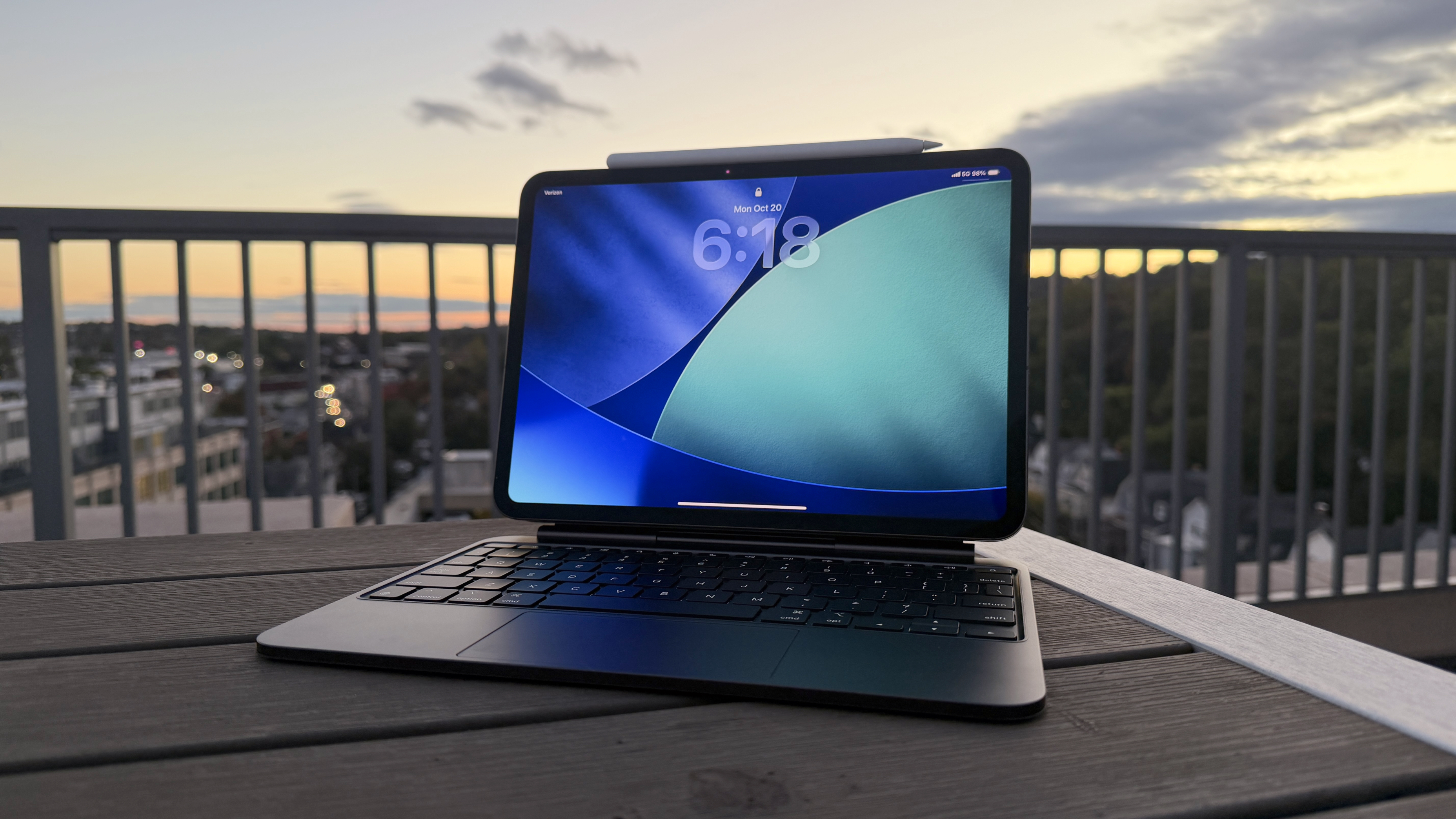
- The M5 chip makes this iPad Pro blazing fast
- It adds in a lot of headroom, leaving me with no concerns about performance for years to come
Arguably, the biggest change with the iPad Pro is the M5 chip under the hood, which powers the entire experience. It drives the display, enables vibrant and immersive visuals, plays back excellent audio from the built-in stereo speakers, and lets you take full advantage of iPadOS 26.
The 2024 iPad Pro was the first Apple device to get the M4, and the M5 chip duly makes its debut in the 11-inch and 13-inch iPad Pro, alongside the new Vision Pro and new 14-inch MacBook Pro. Apple is spreading its latest 3-nanometer silicon across more devices, and it shines on the iPad by making an already fast device even faster.
In the 1TB iPad Pro I’ve been testing, and also in the 2TB model, the M5 chip is configured as follows: a 10-core CPU with four performance cores and six efficiency cores, a 10-core GPU with hardware-accelerated ray tracing and neural accelerators, and a 16-core Neural Engine. It also comes with 16GB of RAM and 153GB/s of memory bandwidth.
This results in incredible performance day in and day out. Like the models before it – or even the 11-inch iPad Air with M3 – it’s a challenge to make this iPad Pro slow down. Apple has made the ultimate iPad even faster, and increased the headroom further.
Many of the improvements in the M5 chip help it perform even better for AI-focused workflows. Pixelmator Pro handled ‘Super Resolution’ faster, and cleaning up handwriting in GoodNotes was lightning quick. The same goes for using Stem Splitter in Logic Pro to separate recordings, or exporting 4K footage in Final Cut Pro. Games – whether smaller titles or full AAA releases – were a blast to play, with the performance and graphics combining to create wonderfully immersive worlds.
The 11-inch iPad Pro with M5 was simply a powerhouse in my testing, to the point that I effectively moved my entire workflow from a 14-inch MacBook Pro with M4 to this iPad paired with the Magic Keyboard. Between the chip and iPadOS 26, everything feels fast, smooth and completely dependable, and the software is finally close to matching the hardware. If you’re after a desktop-like experience, you can plug the iPad Pro into an external display, and it can offer up to a 120Hz refresh rate – that’s more of a surprise addition, and might hint that a new Studio Display from Apple is on the horizon.
I also ran the 11-inch iPad Pro with M5 through Geekbench, a standard benchmarking tool used by TechRadar. The 1TB model scored 4,121 single-core and 16,240 multi-core – outpacing the M4 iPad Pro (3,700 and 14,523, respectively) and the 11-inch iPad Air with M3 (3,023 and 11,716).
While we haven’t tested them, the 256GB and 512GB models come with a slightly less powerful M5 chip: a 9-core CPU (three performance and six efficiency cores), a 10-core GPU with neural accelerators and hardware-accelerated ray tracing, and a 16-core Neural Engine. That’s paired with 12GB of RAM and 153GB/s of memory bandwidth. For most workflows, this shouldn’t affect everyday performance, though export times for creative tasks might be slightly longer.
Simply put, the iPad Pro offers full-throttle performance at nearly every turn. Whether or not you need that much power, the iPad Pro with M5 feels more than capable of taking full advantage of iPadOS 26 – and whatever Apple might be cooking up next. For now, it handles demanding tasks that would push lesser iPads and even some Macs; the performance here is truly next-level.
- Performance score: 5 / 5
Apple iPad Pro 11-inch (2025) review: Battery & connectivity
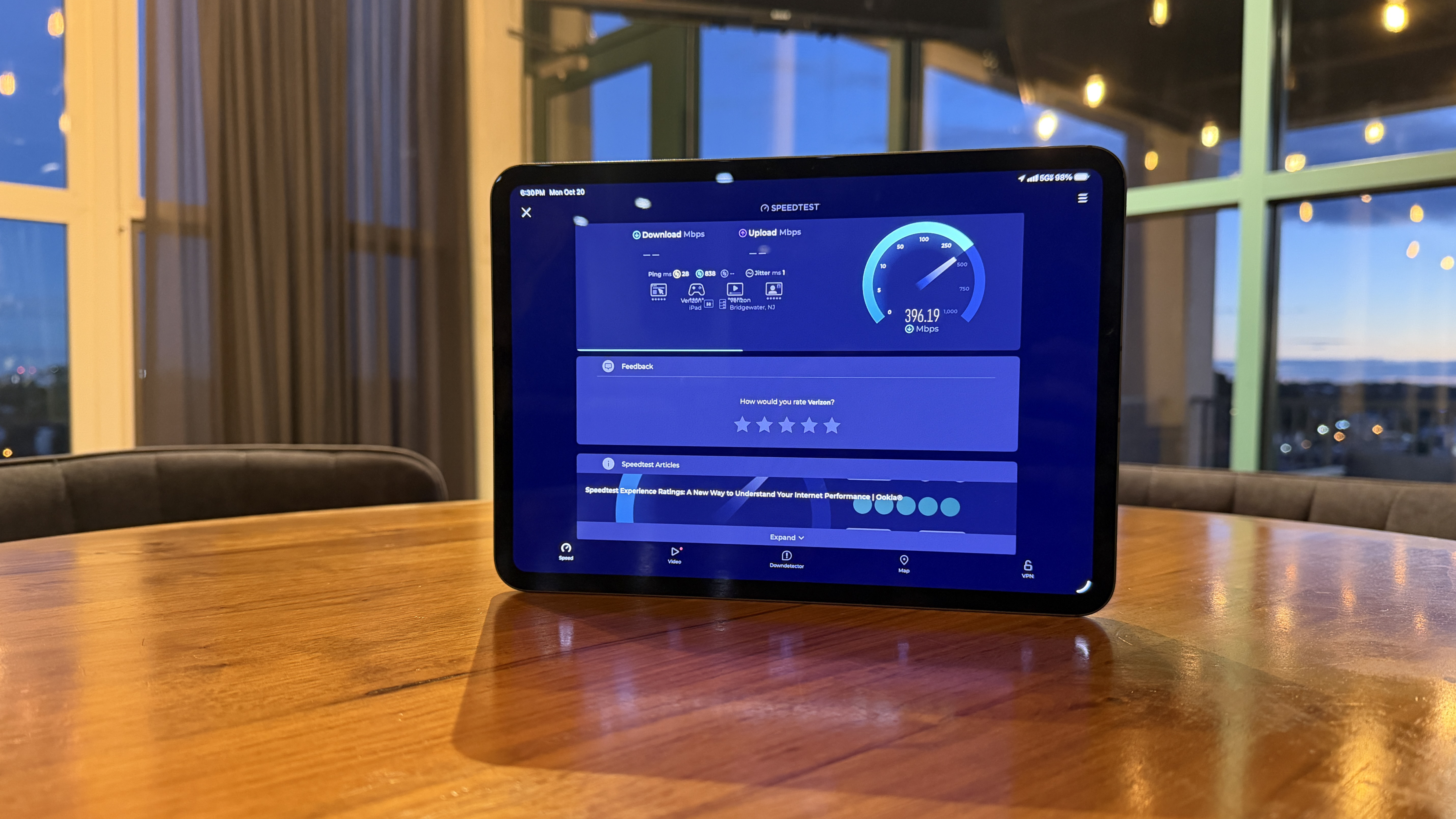
- Still a very efficient battery, with more than all-day battery life
- The iPad Pro now supports fast charging, for 50% in 30 minutes
- Apple’s new C1X modem arrives in an iPad for the first time
As with previous iPads and iPhones, Apple is not sharing the exact battery size for the 11-inch or 13-inch iPad Pro; instead, the tech giant likes to share estimates for browsing and playback times. Apple promises that you can get up to 10 hours of surfing the web or watching video on Wi-Fi, or up to nine hours of web surfing with a cellular connection.
Those are the same numbers as for the M4 iPad Pro, so it’s likely Apple didn’t increase the battery size under the hood, but the M5 efficiencies, along with the Apple-made modem, likely help to keep that pace, and it’s actually the same promised battery life as the 13-inch iPad Pro with M5.
In my testing, even when using the iPad Pro for work paired with the Magic Keyboard, I got a full day out of it with close to six hours of screen time, which is very good for an iPad. Battery life isn’t much of a concern with recent generations of iPads, and this year Apple is looking to further alleviate any qualms with the arrival of fast charging.
While the 11-inch Pro ships with a 20-watt USB-C adapter in the box, you can pair this iPad with Apple’s own 40W Dynamic Power Adapter that can push up to 60W, or simply opt for a 60W power adapter to charge this iPad up to 50% in 30 minutes. With Apple’s own 40W adapter, I did meet the 30-minute mark exactly here, but with a higher 65W adapter, I saw it hit 50% in a bit less time.
Aside from the upgrade to M5 from M4 – and more RAM for the 256GB and 512GB models – Apple’s other big hardware change was moving to its N1 wireless chip and C1X modem. The former here delivers Bluetooth 6, Wi-Fi 7 and support for the Thread smart-home connectivity standard, while the latter represents a move to Apple’s own in-house modem.
These upgrades deliver two major perks, according to Apple: up to 30% lower power consumption than on the previous-generation iPad Pro and 50% faster cellular data speeds. As cellular iPads have been for some time, it’s an eSIM-only experience here across the globe.
I’ve been testing Verizon’s network, which is particularly strong in New Jersey and New York, mostly seeing three or four bars with 5G UW showing in the top corner. When working from a coffee shop or simply on the road, it felt just as dependable as using my home network, and at times delivered faster download and upload speeds.
It’s a nice swap for an Apple-made modem, and the M5 Pro has been performing just as well as previous cellular iPads I’ve tested, but the arrival of the N1 chip for modern Wi-Fi and Bluetooth standards is also welcome here.
- Battery and Connectivity score: 4 / 5
Apple iPad Pro 11-inch (2025) review: Should you buy it?
Attributes | Notes | Rating |
Value | There's no getting around the cost at $999 or$1,299, but the iPad Pro delivers excellent performance in a sleek, stunning build with a great display. | 4.5 / 5 |
Design | Apple didn't change much with the design here, in fact it's nearly identical, but the ultra-sleek build makes it one of the best designed tablets. | 4 / 5 |
Display | Just like the design, Apple's sticking with it's impressive tandem OLED screen here which offers an immersive experience led with vibrant colors and stark contrast points. | 5 / 5 |
Cameras | Even though the cameras remain unchanged year over year, and folks coming from an older iPad Pro might miss the ultra-wide camera, the two onboard do get the job done. | 4 / 5 |
Software | iPadOS 26 was a big upgrade that delivered a number of new features including using windowed apps, more Pro tools, and background tasks that all shine on the iPad Pro. Of course, you can still use one app at a time as well. | 4.5 / 5 |
Performance | The M5 chip provides a ton of power for any possible task, and made it really difficult to get the iPad Pro to even slow down. | 5 / 5 |
Battery and Connectivity | Apple didn't increase the battery size internally, but it still offers all-day battery life like the previous generation. | 4 /5 |
Buy it if...
You have an older iPad
The M5 chip in the iPad Pro alleviates any performance concerns for the foreseeable future, delivering blazing-fast speed in daily use. If you have an older iPad Pro with an M1 chip, or an iPad that’s still running an A-Series processor, the performance gains here – paired with the sleek build and excellent display – make this a great upgrade.
You want an immersive, jaw-dropping display
The Ultra Retina XDR Tandem OLED screen on the iPad Pro is simply stunning, with vibrant colors and excellent contrast. Whether it’s for work, gaming, or watching films, this is the iPad to get if you want the best display experience.
Don't buy it if...
You don’t want to break the bank
$999 for the 11-inch iPad Pro or $1,299 for the 13-inch is no small investment, and if you can live without the OLED display or ultra-thin build, I’d suggest looking at the iPad Air with M3, which also comes in two sizes and offers excellent performance.
You’re not looking for a new main device
If you don’t need an iPad that can replace your main computer, you might be better off looking at an entry-level iPad with A16, an iPad mini, or the iPad Air.
Apple iPad Pro 11-inch (2025) review: How I tested
I spent five days thoroughly testing the 11-inch iPad Pro with M5, specifically a Space Black 1TB model with cellular connectivity. I also tested it with a matching Magic Keyboard in black and an Apple Pencil Pro. After unboxing it – you can check out my unboxing video on TechRadar’s TikTok – I quickly got to setting it up, and adding the apps and services that I would normally use on my iPad.
For much of my testing period I aimed to use the iPad Pro M5 as my main work device, which meant sidelining my 14-inch M4 MacBook Pro, and writing, editing, taking meetings, sending Slack messages, and writing emails on the iPad Pro M5. I also played games, sent messages, edited photos, and streamed movies, TV shows, and music, as well as making and taking many video calls.
To test cellular, I used a Verizon eSIM and ran various speed tests and upload tests in different locations to get a feel for performance.
First reviewed October 2025.

Jacob Krol is the US Managing Editor, News for TechRadar. He’s been writing about technology since he was 14 when he started his own tech blog. Since then Jacob has worked for a plethora of publications including CNN Underscored, TheStreet, Parade, Men’s Journal, Mashable, CNET, and CNBC among others.
He specializes in covering companies like Apple, Samsung, and Google and going hands-on with mobile devices, smart home gadgets, TVs, and wearables. In his spare time, you can find Jacob listening to Bruce Springsteen, building a Lego set, or binge-watching the latest from Disney, Marvel, or Star Wars.
You must confirm your public display name before commenting
Please logout and then login again, you will then be prompted to enter your display name.
